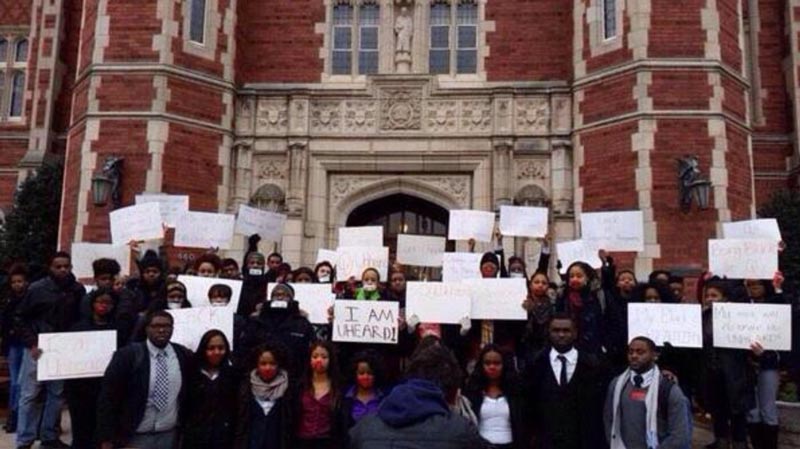In recent years, I’ve increasingly been noticing a dynamic that I’ve been coming across more and more often on college campuses. More specifically, it is something I’ve observed amongst the social justice communities within campuses (the groups/offices, etc. that use the language of social justice). It’s a dynamic that I believe is even more acute in the more competitive campus cultures in higher education. Am I the only one who has noticed that there is a culture of ‘out-social-justicing’ others? (Yes I’m aware that I completely made up that word/phrase; be warned this will be the last time)
I increasingly have been hearing conversations, particularly amongst students, who seem to duel each other with language that proves that they’re more social justice-ey than someone else. It might involve someone who might say something to the effect of, “Like, he’s such a Cis-gendered, white, straight male who is obviously transphobic without a feminist lens that considers the intersectionality or racism, heterosexism and gender spectrum that queer people of color spaces address.” (This is hyperbole, but not by much!)
Don’t get me wrong, I think it’s great that students as well as others in our campus communities are becoming more deeply engaged in social justice issues. However, I think this elitism is increasingly making the work seem less accessible and approachable to others who might otherwise want to get involved and enact meaningful change in the world around them. The worst thing about it is that I often see people justifying superficial judgments on others based on what they think someone else doesn’t know or understand about social justice issues. We have to remember that a large portion of social justice work is EDUCATION; meaning that there is a process of learning that everyone is undergoing to better learn about these issues.
Over the years, I have met more and more people who feel intimidated by the culture surrounding campus social justice work. It is for this reason that I think this issue is important. I’m not trying to say that this issue is as important as the issues we seek to challenge and address in our work, but rather acknowledge two main issues related to this. First, we lose the energy, creativity and investment that come from potential allies to marginalized communities who otherwise could have important contributions to make (we need as many people as possible y’all). And just as importantly, how messed up is it that people who say they’re about social justice often act like they’re better than people who don’t? Kind of a problem don’t you think? How can we create inclusive and respectful communities that empower marginalized people in a manner that enfranchises everyone if we are perpetuating that type of elitism in the process?
In witnessing this dynamic, I’ve also come to notice ‘allies’ who can be so vocal and visible that the group being marginalized aren’t even being seen or heard. For example, I have seen more and more white people serving as the face of anti-racism efforts as related to racist incidences on campuses. I think it’s great that they want to stand publicly against racism, but being an ally means leveraging one’s privilege to empower the marginalized. I’ve seen examples in which most people of color’s interpretation of an incident was not even the same as the white folks but they’re out there making assumptions that everyone else sees it the way they do. My sense is that they’re trying to ‘prove’ their social justice chops but end up perpetuating the very dynamic that they are standing against. All the while, I end up hearing all the big inaccessible words in the process that most of the general public don’t even understand.
Although I’m certainly not the first person to talk about social justice elitism, I think it is important that we continue to talk about this issue in our work. This dynamic has led me to experience what should be a false-dichotomy in social justice work. I feel like I’ve been experienced a dynamic of ‘campus social justice’ versus ‘community social justice’ efforts. I’m not saying that non-campus social justice efforts are not capable of similar dynamics, but I see it far less than I see it on campus. In addition, many campus social justice efforts operate in a vacuum of campus issues often disconnected from broader community dynamics in the very communities and regions in which their campuses sit.
It is always so surreal for me to experience the contrast between places like University of Michigan and Detroit. The way the conversation and action occurs is dramatically different. But I see that same dynamic in the Bay, Chicago, the East Coast and many other places around the country. The reality is that, as we know, this work needs to emerge from community and we need to have authentic relationships that focus on empowering voices of the marginalized. There is nothing wrong with us knowing the big words and understanding the concepts, or even addressing the issues within the vacuum of campus life (because we need to incubate examples and models of what we’re talking about); but if we are not recognizing that we on campuses need to remain focused on how we’re leveraging our agency, privilege and access to resources for the broader society, we are missing the point of why we’re here and simply perpetuating an ongoing dynamic of elitism while acting like that’s not what we’re actually doing.

